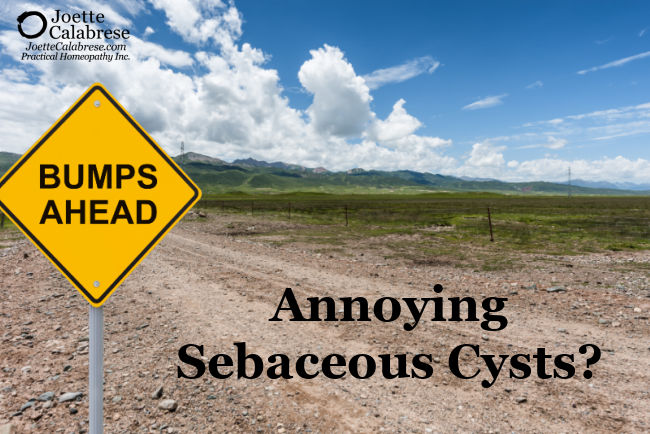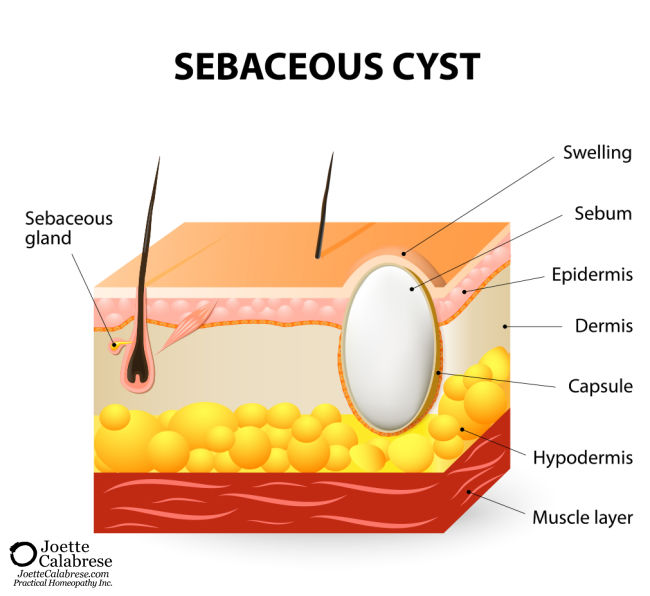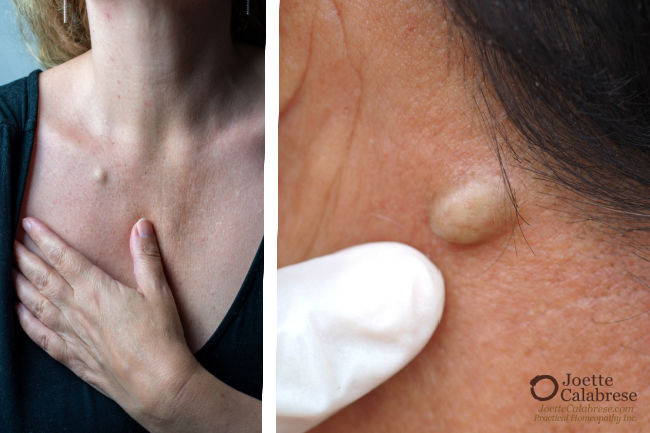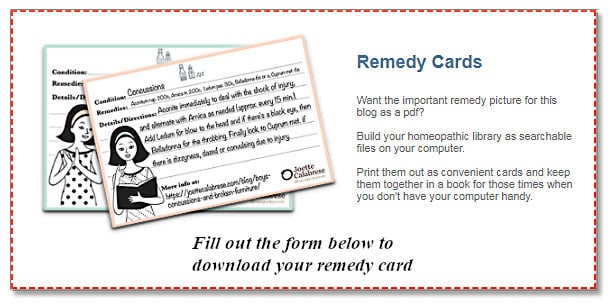Let’s continue our discussion on cysts. If you missed it, I taught about two homeopathic medicines clinically shown to address pilar cysts last week. This week, I will move on to sebaceous cysts.
What Are Sebaceous Cysts?
The term “sebaceous” can be a bit of a misnomer, but it is commonly used. More accurately called epidermal inclusion cysts, these lumps typically occur on the face, neck, torso or groin. While this type of cyst may be cosmetically annoying, they are often harmless. They generally grow fairly slowly as they fill with keratin, fat and skin particles.
A true sebaceous cyst (filled with sebum that results from a dysfunctional sebaceous gland or duct) is much less common.
Sometimes, sebaceous or epidermal inclusion cysts can remain stable for years. However, they can eventually burst and become infected.
If you’re unfamiliar with sebaceous cysts, here are a couple of photos to help you identify them. Of course — as always with Practical Homeopathy® — when in doubt, get a medical diagnosis before choosing a homeopathic medicine. We choose our medicines by symptoms and the name of the condition. Choosing the medicine with the tightest fit to the sufferer’s need is an integral step in successfully employing homeopathy.
The Homeopathic Answer to Sebaceous Cysts: Conium
My clinical experience has shown that Conium maculatum 6, twice daily has successfully acted. Keep in mind that this is not a protocol, so either a 6X or 6C may be employed.
Generally, sufferers have utilized this medicine until the cyst is pretty much gone. Now, it may not be 100% gone. It might just go down, go down, go down until one is left with something relatively small. If it stays like that, then I would just leave it.
These Medicines Are Often Organ-Specific and Location-Specific
As we’ve discussed cysts these last two weeks, please note that we are talking about cysts occurring on the skin (not in an internal organ). Location often matters as we repertorize conditions. Correctly choosing a tightly fitting homeopathic medicine is generally organ-specific (in this case, the skin) and sometimes location-specific as well (such as cysts on the scalp as opposed to cysts on the wrist).
Teaching organ-specific remedies is a big part of how I train my students in The Academy of Practical Homeopathy®. I also use the same organizational method in most of my protocol courses.
For instance, if a cyst occurred in a female organ (such as an ovarian cyst), the sufferer’s organ-specific education would be contained in my Feminopathy course.
Additional organ-specific information on cysts occurring on the skin — the largest organ in the body — can be found in my course, Skin, the Ugly Truth: Safe, Effective Treatment of Skin Ailments, Chronic or Acute, with Homeopathy. In fact, I just counted 13 references to various skin cyst symptoms in the timestamps for that course. It’s a wealth of information for skin conditions of all types, from acne to shingles to vitiligo and everything in between.
Ganglion Cysts
For now, to conclude my series on cysts, I will discuss ganglion cysts in my next Memo to Mighty Members. (Those are the cysts on the wrist or the back of the hand. Remember, location matters.)
Unfortunately, you'll miss that information if you’re not one of my Mighties. Why don’t you join us? What are you waiting for?
Not only do Mighty Members get an extra weekly blog post in the form of my Memo to Mighty Members, but they also receive exclusive educational videos, a private discussion forum (where we all can be more candid than we can be on public social media), and an archive of my Monday Night Lives with a convenient searchable index! Plus, there’s so much more. I don’t mean to sound like an infomercial, but it’s a great deal of value for less than the price of one fancy coffee and muffin each month. I look forward to seeing you there.
Pass on the good news of Practical Homeopathy®!
Warmly,
P.S. Don’t forget all my Mighties (Joette’s Mighty Members) qualify for a 10% discount on course purchases. If you need assistance getting your discount, email [email protected] for more information.








If you had both a pilar cyst on scalp and a sebaceous cyst on body, is it ok to take BOTH remedies on the same day? Or should you alternate days?
Ask yourself which cyst is most sobering, most concerning, most noteworthy and choose that the medicine that is associated with that. We often find that one medicine covers many conditions hence the more edited the schedule the better.
I took 2 doses of Conium 6c and within 30 min the small back cyst (at edge of bra strap) began to felt sore (as if a pimple was about to pop type of soreness) and the color changed from skintone to a reddish hue. It also got just a bit larger and feels a bit fuller — maybe coming to a head?
Does this mean the remedy has begun to work? Should I stop dosing now? Or do I continue with 2 x day doses until the cyst becomes smaller?
Much thanks! I have tried so many remedies for this darned sebaceous cyst and nothing has worked very well until your rec of Conium.
Thanks!
It means the medicine is acting. Based on my experience it usually means that when the medicine is used over a period of time, it will likely resolve.
Hi Joette!
Update:
Great news! My cysts is almost completely flat now at Day 12!
It started out the size of a no2 pencil eraser head when I began with Conium. Once I began the Conium 6c, it got larger to about double the size; I was a bit worried at that point but continued with the remedy, 2 x day. One day, after my shower, the entire cyst turned white, similar to a whitehead. I was worried it might be pus because it felt sore — similar to a pimple that was about to pop. Yuck lol. A few days later, without needing any compresses, it began to expel the contents slowly. There was NO smell, so I assumed it was not pus. It did still feel a bit sore, but once the cyst began expelling the sebum? or keratin? the soreness went away.
Around 3 days ago (1 week in), it began to bleed a little bit, but I stucck with the remedy. I had been covering the area lightly with a thin gause pad for a few days. I used a bit of vaseline over the area to keep the cyst tiny hole open so it would continue to drain (I read this in another homeopathy article on cysts) and to keep the gause from sticking to the wound. When it began to bleed a little, it also stung a bit, as if one had a scrape or cut. I added in Hepar Sulph 30c just in case there was any infection (which the other homeopathy article also mentioned to do).The pain went away.
Question:
The area is almost completely flat, but it still looks like an open sore or scrape or gouge. It is very small — half the size of a no 2 pencil eraser. A tiny bit of blood was on the gauze this morning. There is no pains. IF I press lightly around the surroundingnarea, a teeny tiny bead of that white material comes out.
1
Do I continue with the Conium 6c?
How do I know when to stop?
When the white mayerial no longer comes out? Or when also the bleeding stops? It is a teeny amount of blood, and only leaks out occasionally — usually after a warm shower.
2.
Will the Conium 6c also expel the cyst sac? I read that if the sac is not removed, the cyst can refill in the future. I am guessing the sac would be similar to the bulb of a whitehead?
3.
When all the contents of the cyst have been expressed, should I put Calendula on it to close the open wound? Again, it is very small. Or do I just stop the Conium and allow the cyst hole to heal on its own? What to do?
Much thanks for this article!! I have dealt with this darned cyst for so long and nothing was working that well. It did get smaller with other remedies, but never totally got flat. This is the best result I have gotten on this sebaceous cyst. I am so happy!
Thank you!
I can’t offer personal medical advice but given that the directions are to use homeopathic medicines until very much better, it will be pretty clear what should be done.
Even if you get it “wrong” you’ll be able to return and get it right at a later date.
Update (for anyone having a similar sebaceous cyst issue)
I am at the 1 month mark, and have continued using the remedy. My cyst is almost completely flat. I cannot even see it. I have to press over the area and barely feel a bit of a bump. 🙂 There is still an occasional slight filling of the cyst, but barely felt. I will continue with Conium until it is completely flat and no longer refilling.
Note:
About 2 weeks ago, I added in Hepar Sulph 30c to aid with the emptying of the cyst because the tiny opening seemed to have closed off. The Hep Sulph helped to open back up. I have been applying vaseline over the cyst to keep the tiny hole open to drain and am covering it with gauze and tape. I read the info re the vaseline from another holistic article online.
Thanks again Joette for this article. It has worked so well for my back cyst!